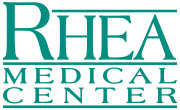
Let’s face it, a visit to the emergency department is never fun. It can be downright frightening. But at Rhea Medical Center’s emergency department, we are committed to making your experience with us as effective, efficient, and as pleasant as possible.
We have listed some frequently asked question regarding emergency care. We have found that when patients and their family members know what to expect, it helps ease some of their anxiety and frees us up to focus 100% of our attention on the patient’s medical care.
Questions and Answers
Q: We were here first. Why have those other people been seen ahead of us?
A: Waiting can be frustrating, and when you’re hurt, sick, or just uncomfortable or worried, even a few minutes can seem like hours.
In an emergency setting, patients who are the most seriously ill or injured will be cared for first. For this reason, patients are often not treated in the order of their arrival. Often, critical or serious symptoms are not obvious to the eye, but are picked up by the nurse at the time of the patient’s triage when the nurse does the assessment.
Our staff appreciates your understanding and patience as we evaluate and care for all of the patients based on the severity of their medical problems. If you feel your symptoms are getting worse while you wait, or if you need to leave the waiting area, please make our staff aware of this.
Q: How are my medical needs determined?
A: To help us assess your medical situation, one of our nurses will ask you the reason for your visit and check your vital signs, including temperature, heart rate, respiratory rate, blood pressure, and oxygen saturation. The nurse will also question you about any allergies and medications you are currently taking, and the dosage of these. You will also be asked about your past medical and surgical history, as well as that of your family. These are important questions that might indicate a risk of problem areas.
Q: I have completed the triage process. What’s next?
A: Please remain in the waiting area until your name is called. We will respond as quickly as possible to your medical need according to the seriousness of injury or illness as compared to other patients waiting to be seen.
Once your name is called, a nurse will escort you to a treatment room. If your name is called and you do not respond, the next patient will be called.
Q: I am in a treatment room. What happens now?
A: In order to determine life- or limb-threatening illnesses or injuries, or to stabilize such conditions, a trained emergency department physician will perform a medical screening evaluation. This evaluation may include testing or consultation with a specialist. You will also be asked a number of questions — some of our questions may seem repetitive, but this process is necessary to make sure we have uncovered all vital information to determine proper treatment.
Q: What’s next? Admission or discharge?
A: If your visit results in an admission, we will make arrangements for a room as quickly as possible. Keep in mind that this is an unplanned admission for both you and us, so it may take slightly longer than usual to prepare a room for you. Again, your patience is appreciated.
If you are treated and released, you will receive discharge instructions, including a physician’s name for follow-up care and his/her office number and specific instructions to return to the emergency department if your symptoms become worse. If you had x-rays taken while in the emergency department and are referred to your family doctor for follow-up, you can pick up your x-rays the day of your appointment in the radiology department.
Q: What do visitors need to know?
A: In order to provide fast and efficient care for our patients, the door to the emergency treatment rooms remains locked at all times. This keeps traffic flow in the hallways to a minimum so doctors and nurses can care for patients, and it protects patient confidentiality and privacy. For these same reasons, visitors are asked to please stay in the rooms and not stand in the hallway or doorway.
When looking for a patient, please check with the nursing station for room numbers. In most cases, two visitors are allowed in the patient’s room after the examination and/or procedures are completed. If more family members are present, please ask that one keep the others updated on the patient’s condition. Visitors may also take turns staying with the patient. If you have a questions or concern about our visitors’ policy, please ask a nurse.
